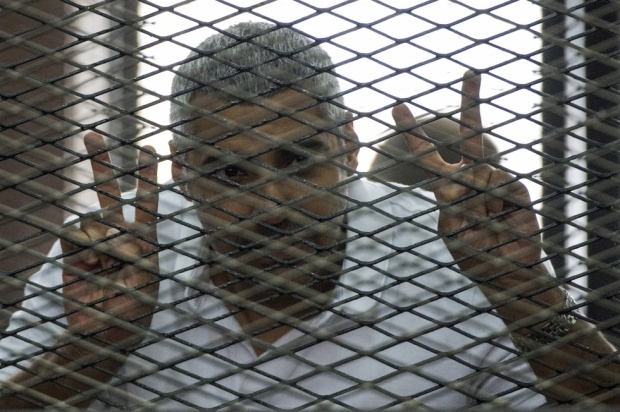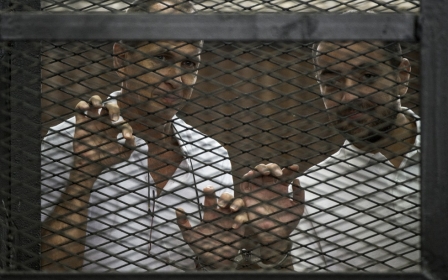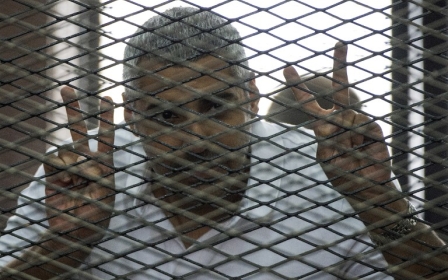When the only good Egyptian is a Canadian

At a time of unprecedented Egyptian hyper-nationalism, when Egypt is framed as the mother of civilization and the greatest nation in the world, and when Egyptians are presented as an example of all that is good, the only things that can save a falsely accused Egyptian are his Canadian citizenship and the complete renunciation of his Egyptian nationality.
Some may be surprised at Tuesday's news that Al-Jazeera journalist Mohamed Fahmy has reached an agreement to gain his freedom by formally renouncing his Egyptian citizenship. But it's only surprising if one hasn't been paying attention.
On 3 July, 2013 - the day of Egypt’s military coup against democratically elected president, Mohamed Morsi - an aggressive campaign of re-identification of Egyptian-ness was launched. Those who offered up undying, uncritical support for Egypt's key state institutions - the military, police and judiciary - became the bearers of the true Egyptian identity. Those who opposed the military intervention and the repression that ensued in its aftermath were summarily dismissed of their Egyptian identities, or, at least, reduced to a type of second-class status. In the lead-up to and aftermath of the military takeover, Egyptian media outlets repeatedly referred to supporters of the 3 July political order as “the nation,” while intimating that opponents of the new order were both few in number and essentially un-Egyptian.
Groups and individuals who opposed the new political order were recast as enemies of the state, criminals, disloyal, treasonous, un-Egyptian. When they were killed, mass arrested, issued mass death sentences, and formally eliminated from Egyptian public life, true Egyptians were expected to react by praising the elimination of "the enemy".
In the days after the coup, the Egyptian government and its sympathisers spoke ominously of the need to "cleanse" the nation. Early on, focus remained for the most part limited to the Muslim Brotherhood, the group that was removed from office as part of the coup and declared to be public enemy #1. Famous television journalist Lamees Al-Hadidy put it this way on 3 July, 2013: “Egypt is coming back to us … neither the French, nor the English, nor the Israelis … nor the Muslim Brotherhood” can “rape” the people of Egypt. The association of the Muslim Brotherhood, a distinctly Egyptian group, with previous foreign occupiers of Egypt could not be lost on anyone paying attention.
Within weeks, the regime’s wrath was extended beyond the Muslim Brotherhood. Prominent liberal politicians and groups who opposed the nation’s new direction were similarly outcast as disloyal to “the nation.” Outcast figures included the April 6 Movement, well-known leftist activists Alaa Abdel-Fattah and Ahmed Douma, and a pair of former members of the anti-Brotherhood National Salvation Front, Mohamed El-Baradei and Khaled Dawood, among others.
On 26 July 2013, prominent Egyptian newscaster Khairy Ramadan argued on his broadcast that those who oppose the new political order, and, in particular, the Muslim Brotherhood, do not “understand the meaning of nation.” He also argued that the dissenters were “unpatriotic,” and represented “foreign agents.” In late 2013, musical artist Ali-El Haggar released a pro-military song. The song’s chorus clearly demarcated the battle lines: “You are a nation, and we are a (separate) nation. You have a Lord and we have a Lord.”
Over time, the discursive construction of the true Egyptian was made clearer in Egyptian media and by high-level Egyptian politicians, who repeatedly emphasised the importance of cleansing the nation from impure elements.
Mohamad Fahmy’s forced renunciation of citizenship should be seen as part of these larger projects of purification and identity construction. It is likely that Fahmy’s surrender of citizenship will be framed inside Egypt as a victory for Egyptian nationalism and the pure Egyptian identity. Some Egyptians have already taken to social media to denounce Fahmy as not truly Egyptian and claim that they would rather die in jail than renounce their citizenship. Others have affirmed their belief that Al-Jazeera is an enemy, actively seeking to undermine the Egyptian state.
These types of reactions are predictable, particularly given the type of “Sisi-mania” that has enveloped large sections of Egyptian society and the extent to which Abdel Fattah al-Sisi, Egypt’s current president, has gone to reinforce a proper notion of Egyptian-ness. Sisi, the man who carried out Egypt’s 2013 coup, has addressed “the honourable” Egyptians in his speeches, repeatedly praised Egypt’s national institutions as anchors of the state, associated the military with prominent Egyptian symbols, and invoked memories of Egypt’s past glory, including, importantly, the Nasser period.
Image restoration, not democratic reform
Egypt’s attempts to stifle dissent by arresting journalists and framing them as threats to the nation must be viewed within the larger context of post-3 July repression. This week's release of two journalists from jail will be praised by some observers as a democratic step forward, as a move toward respecting freedom of speech and of the press. Such praise will be misguided, however. These recent moves should be seen as acts of desperation by a government engaged in what public relations scholars call "image restoration." Egypt's government is scared by the negative coverage it has received abroad, and is worried that Australia, Canada and other western nations might, at some point, withdraw their tacit support for the military takeover. News of Egypt's human rights abuses has become a major thorn in the side of the Sisi presidency. Something had to be done.
Of course, the Egyptian government is not at all interested in democratic reform. If the government were interested in genuine democratic reform, it might consider releasing some of the thousands of political prisoners currently locked up in Egypt's jails, repealing draconian laws that prohibit dissent and protest, reversing mass death sentences, reintroducing banned political parties, reopening banned news outlets, and launching serious investigations into mass killings that have left hundreds dead. None of this is at all likely. Democracy in Egypt could lead to accountability and structural change, a combination that would likely land many leaders of Egypt's coup in the same jail the "enemy" currently occupies.
- Dr Mohamad Elmasry is an Assistant Professor in the Department of Communications at the University of North Alabama. In 2009, Dr Elmasry received his PhD in Mass Communication from the University of Iowa, where he was a Presidential Fellow. His PhD dissertation examined constraints on news production in Egypt. Dr Elmasry held an assistant professorship at Qatar University from 2009-2011, and at the American University in Cairo from 2011-2014. Dr Elmasry has appeared regularly on international television news networks, including CNN, The BBC, Al-Jazeera English, and Al-Jazeera America.
New MEE newsletter: Jerusalem Dispatch
Sign up to get the latest insights and analysis on Israel-Palestine, alongside Turkey Unpacked and other MEE newsletters
Middle East Eye delivers independent and unrivalled coverage and analysis of the Middle East, North Africa and beyond. To learn more about republishing this content and the associated fees, please fill out this form. More about MEE can be found here.





